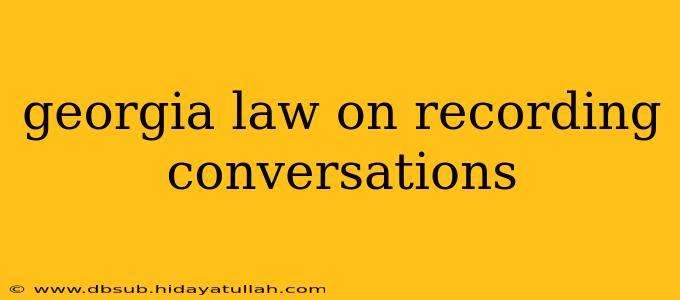Georgia is a "one-party consent" state when it comes to recording conversations. This means that only one participant in a conversation needs to be aware of and consent to the recording. This seemingly straightforward law, however, has nuances that require careful consideration. This guide will break down the intricacies of Georgia's laws regarding recording conversations, highlighting key exceptions and potential legal pitfalls.
Understanding Georgia's One-Party Consent Law
Georgia's wiretapping and eavesdropping statute, O.C.G.A. § 16-11-62, allows for the secret recording of conversations as long as at least one party to the conversation consents to the recording. This means you can legally record a conversation you're a part of without informing the other participants. However, this doesn't grant carte blanche to record anyone, anywhere, anytime.
Key Aspects of the Law:
- Consent is Key: The crucial element is the consent of at least one party. This consent doesn't need to be explicit; it can be implied through actions or prior agreement. For example, if someone knows they are being recorded during a meeting and doesn't object, implied consent may be established. However, it's always advisable to obtain explicit consent whenever possible to avoid any ambiguity.
- Privacy Expectations: The law doesn't explicitly address conversations held in public places. However, individuals generally have a lower expectation of privacy in public spaces. While recording conversations in public is generally permissible under Georgia law, it's important to be mindful and respectful of others.
- No Reasonable Expectation of Privacy: The law focuses on situations where individuals have a reasonable expectation of privacy. This means that recording conversations in private settings, such as a home or doctor's office, where there's a clear expectation of privacy, is subject to the same one-party consent rule, but with heightened scrutiny for potential violations if other applicable laws are broken.
- Distribution and Use of Recordings: The legality of the recording is separate from the legality of how it's subsequently used. Distributing a recording without consent, or using it for illegal purposes (e.g., blackmail, harassment), can lead to serious legal consequences, regardless of whether the initial recording was legal.
Exceptions and Potential Legal Issues:
While Georgia's one-party consent law is relatively permissive, several exceptions and potential legal challenges exist:
1. Recording Conversations in Private Settings:
While you can record a conversation in a private setting with the consent of one participant, it's crucial to be aware of other laws that could be implicated. For example, invasion of privacy claims could arise if the recording is used to cause emotional distress or harm to another.
2. Illegal Purposes:
Using recordings obtained legally for illegal purposes, such as blackmail, harassment, or violating other state or federal laws, is a separate crime and will be prosecuted accordingly.
3. Federal Laws:
Remember that state laws regarding recording conversations may not always align with federal laws. Certain federal regulations, such as those governing financial institutions or healthcare providers, may impose stricter requirements regarding the recording of conversations.
4. Workplace Recordings:
Georgia law doesn't explicitly address workplace recordings. However, employers generally have the right to monitor employee communications in certain circumstances, particularly if done openly and with clear notification. Conversely, employees recording conversations in the workplace without consent could face disciplinary action or legal issues.
Best Practices for Recording Conversations in Georgia:
To avoid legal problems, consider these best practices:
- Obtain explicit consent whenever possible: While not always legally required, it's the safest approach. A simple verbal or written confirmation can protect you from any legal challenges.
- Be mindful of privacy expectations: Avoid recording conversations where individuals have a reasonable expectation of privacy without their consent.
- Use recordings ethically and legally: Only use recordings for legitimate purposes and never distribute them without consent.
- Consult legal counsel: If you have questions or concerns about recording conversations in specific circumstances, it is always best to seek advice from a qualified attorney.
This information is for educational purposes only and not legal advice. Consult with an attorney in Georgia for advice tailored to your specific situation.
